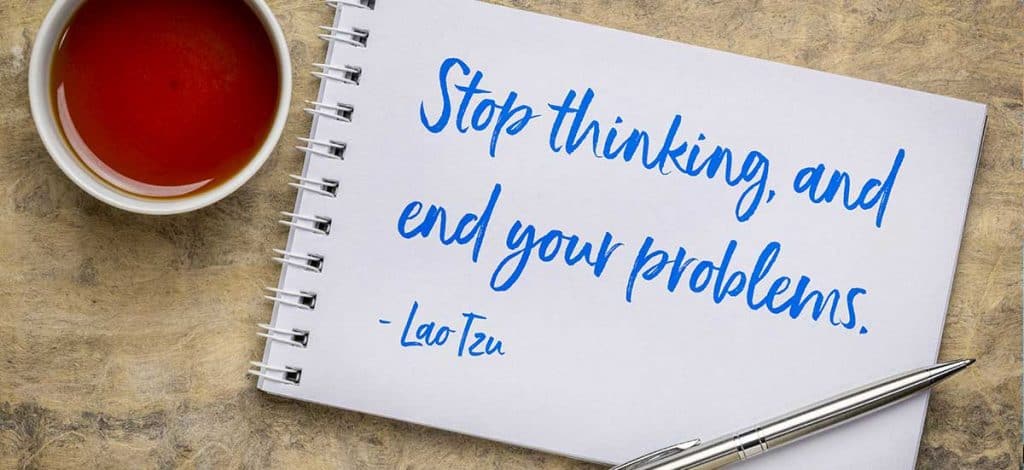Everyone overthinks. It is entwined in our DNA because we are humans. One source from the book Sapiens, suggests that we are worried and anxious creatures, driven by fear and the desire to succeed, because we evolved very quickly from being middle tier scavengers, to being the top of the food chain. We are, essentially, always watching our backs from long ago when our ancestors had to.
This instinctual part of us can get in the way of living a modern life, yet it is difficult and often confusing to simply change who you are. However, it is a misconception that you are your emotions. Simply put, you are not your emotions. You are, in fact, a person who is surrounded by emotions all the time; Emotions of happiness, sadness, anxiety, guilt, fear. You have the ability to stop yourself from overthinking, however, your emotions often cloud your true intentions and thought process.
You are human, and every human struggles with overthinking and worry to some extent. Yet, there are ways to combat these instinctual emotions and take control of your mind. Follow these seven different ways to gain control, stop overthinking, and take back clarity.
Grounding exercises
Grounding exercises are one of the best ways to stop overthinking. The purpose of grounding exercises are to keep you focused on the present and in the moment around you, not focused on your thoughts.
One grounding exercise is belling breathing. To belly breathe, put one hand on your chest and one on your stomach and breathe through your diaphragm, so only your belly is pushing out as air comes in, not your chest. This is a great way to calm yourself down if you’re experiencing anxiety or panic attacks.
Another grounding exercise is the 5-4-3-2-1 trick. This one combines your five senses. In your head or out loud, describe five things you see around you, four things you feel, three things you hear, two things you smell, and one thing you can taste. This help brings your attention to the present while you let thoughts pass.
Check out more grounding exercises here.
Mantras
A mantra is essentially a mind tool. That is where the actual word comes from in Sanskrit, manas (mind) and tra (tool). This is usually done for meditation purposes, by repeating the same sound, word, or phrase over and over again until you essentially convince yourself of it as truth. Anyone can utilize mantras to convince themself of what they want to believe, it just takes some practice.
To create what mantra, focus on what you want to change about your thinking. In this case, you might want to stop worrying about getting sick or if people like you. Simply, you then pick the phrase that is opposite of that worry, so you would say, “I am healthy and free of all disease” or “my validation comes from me only”.
Feel free to write this down on a sticky note, in your phone, or wherever you can bring it out and utilize this mantra every day. This will help you continue to prove to yourself that those positive mantras are true. Eventually, you won’t even need convincing.
Talk to your feelings and thoughts
It is tricky to organize your thoughts and feelings. How can you differentiate between what your subconscious is trying to tell you, and what you are simply just overthinking?
An exercise to help with this is to personify your emotions, especially the negative ones. Organize all your emotions in your mind as if they are other visitors, visiting the real you. Instead of saying that you are fearful, recognize that the feeling of fear is just coming to visit you.
If ever you feel anxiety, fear, or worry creeping up to your consciousness, simply say, “Worry, please go away, I have nothing to overthink about right now. Thank you for trying to help, but worrying is not productive currently, so you’re going to have to leave me alone.”
This can seriously help you combat negative emotions, especially if you feel there is constant chatter in your mind.
Differentiate what you can and can’t control
Worrying about something that is out of your control is a waste of time and energy.
If you constantly overthink, you might worry about catching a sickness or worry about your significant other breaking up with you. If you are worrying or overthinking about something like this ask yourself, “can I control anything about this situation right now?”
If there is a certain threat, do what you can do now, like schedule a doctor’s appointment or tell your significant other you need to talk to them, then move on. Realize you have done all you can do in this moment. Spending energy and time worrying is not good for your physical and mental health and has no place infiltrating your mind.
Have belief in something
Whether you believe in God, a creator, the universe, or just that you will have a better life in the future, putting your faith in something positive is key for letting go of negative feelings.
According to the book Habits, the reason why Alcoholics Anonymous works so well at killing bad habits, is because it is very centered in faith in God. People need something else, out of their own control to take over and change what they feel they can’t control.
This goes for over thinking and worrying. Overthinking is a habit that you are feeding yourself, feeding your self doubt and insecurities with. Finding something to believe in may help take some stress off your mind. It gives you something brighter and more positive to look to and look forward to, other than your worries. A positive mindset can really be a healing thing.
Distract yourself
Distracting yourself can be something effective, if you are a person who doesn’t want to act on your overthinking. Sometimes, distracting your mind until the overthinking or negative feeling passes can be very beneficial.
If you are waiting for test results, waiting for a reply back, or know that the caffeine you just consumed was not good for your anxiety, do something to pass the time until it makes sense to confront these feelings, or until they pass.
Some ideas are working out, practicing grounding exercises, calling a friend, listening to a podcast, or any hand eye coordination activity, like a sport, playing piano, or knitting.
Ask for help
Sometimes, thoughts and feelings are too overwhelming and these tricks don’t seem to do the trick. Feelings can be very powerful, confusing, and hard to control. There is nothing wrong with asking for a second opinion in the case you simply cannot calm down your emotions.
Asking a friend, significant other, or parent to help you gain clarity might be someone to turn to. Keep in mind that the answers that are given to you by these individuals are not necessarily going to help you in the long run; These individuals are not your therapist or doctor. They shouldn’t be thought as so, and might not be equipped in their own mental health to help you effectively.
Check out Better Help where you can chat online with a real licensed therapist as much as you want, while still having a weekly therapy session.
There seems to always be something to worry about: Someone in your family is sick, your work is stressful, the future is unknown and scary. These feelings are valid and validating your feelings is essential for feeling secure. However, we sometimes get stuck on a thought or feeling which can be unhealthy for your mind and body.
Instead of wallowing in self doubt, fear, and insecurities, take over your emotions. Recognize that you don’t have to be ordered around by negative thoughts or emotions. Utilize these tips to stop fear from controlling you and finally gain the clarity you deserve.
Answers to some common questions:
These are a few common questions that people who try to stop overthinking ask.
What are negative aspects of overthinking?
- Lack of sleep
- Stress and Anxiety
- Holding on to the past
- Self-criticism
- Difficulty making decisions
- Inability to move on
- Over thinking
- Concerned with issues you have no control over
- Lack of energy
- Emotional and bad tempurment
Can over thinking drain my energy?
Yes, mental energy without any sort of physical outlet absolutely can make you feel exhausted.
Can overthinking cause depression?
Yes, overthinking causes the following, disconnects you from the present, makes you hold on to the past, worried and stress. Overthinking also changes your mood and can make you feel angry or sad which eventually can lead into anxiety and depression.

Quotes that can help you stop overthinking
Don’t let overthinking create problems that don’t exist.
– Zig Ziglar
Remember, today is the tomorrow you worried about yesterday.
– Dale Carnegier
Thinking too much leads to paralysis by analysis. It’s important to think things through, but many use thinking as a means of avoiding action.
– Robert Herjavec
Let our advance worrying become advanced thinking and planning.
– Winston Churchill
You will never be free until you free yourself from the prison of your own false thoughts.
– Philip Arnold



